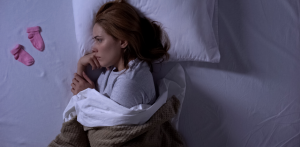The birth of a child is big happiness. But, the process of childbirth takes a lot of physical and emotional strength of a woman. As statistics show, about 80% of women in childbirth experience psychological problems after giving birth. Psychologists classify this condition as “postpartum blues” or “sadness syndrome,” which can worsen and lead to postpartum depression.

The first minutes after the appearance of the baby, the woman experiences a surge of emotions and euphoria. But, sometimes their nervous system cannot cope with such a force of emotions, and after a few days, the woman experiences fatigue, emotional burnout, sadness, an inexplicable desire to cry, irritation, and so on. Scientists are trying to figure out the cause of the onset of postpartum depression, but today they cannot name the true reason for the deterioration in the emotional state of some women after giving birth.
Scientists name several possible reasons that can affect the woman’s psychological state. The first reason may be a change in hormone levels during pregnancy and after childbirth. Hormones are the main source of the woman’s mood, and an imbalance in their balance leads to a disturbance in the woman’s emotional state.
Secondly, having a baby is a big responsibility, and some women experience increased anxiety because of this. Many women begin to doubt that they can become good mothers, and it leads to depression.
Pregnancy is a unique emotional experience that brings unforgettable emotions to every woman. After the birth of a child, a woman may feel a sense of the loss of something very important. Therefore, for the first weeks, she may feel sad.
The child requires a lot of attention, which takes away all the emotional and physical strength. Constant fatigue leads to mental health problems.

Women, who experience support and care from their loved ones after the birth of a child, goes through this stage more easily and adapt to new conditions easier. Therefore, if a woman lives in a conflict situation or lives without the support of a partner and relative, she can have problems with her mental state.
According to the World Health Organization (WHO), every seventh woman after childbirth faces postpartum depression.
Postpartum depression is an officially recognized medical condition characterized by persistent discouragement and a loss of interest in activities that are usually rewarding, as well as an inability to do daily activities, for at least two weeks.
The condition of a woman after childbirth depends on many factors. But, you should not ignore even small violations of your condition. If you feel that you need help, talk about it to your partner, relatives, and doctor. A woman cannot cope with this disease on her own, since he does not have the resources for this. Only a comprehensive approach to the treatment of this condition will help you get out of their depression in a couple of weeks.
Postpartum depression symptoms:
- apathy;
- the feeling of powerlessness;
- lack of joy from communicating with the child;
- chronic fatigue and drowsiness;
- frequent headaches;
- anxiety;
- unreasonable crying;
- irritability;
- aggressiveness, etc.
Postpartum depression most often occurs in the first months after a baby is born. It can occur both in women who give birth in the first and in women who already have children.
Motherhood is a work that brings a lot of joy and happiness. Therefore, if your mental and physical health has deteriorated significantly, you should pay attention to yourself and do everything possible to restore your previous happy state. It is also too important the family and partner pay attention to the women’s well-being. Constant fatigue, the exhausted look of a woman after childbirth, tearfulness, closeness, her unwillingness to leave the house should alarm them.
Comments are closed, but trackbacks and pingbacks are open.